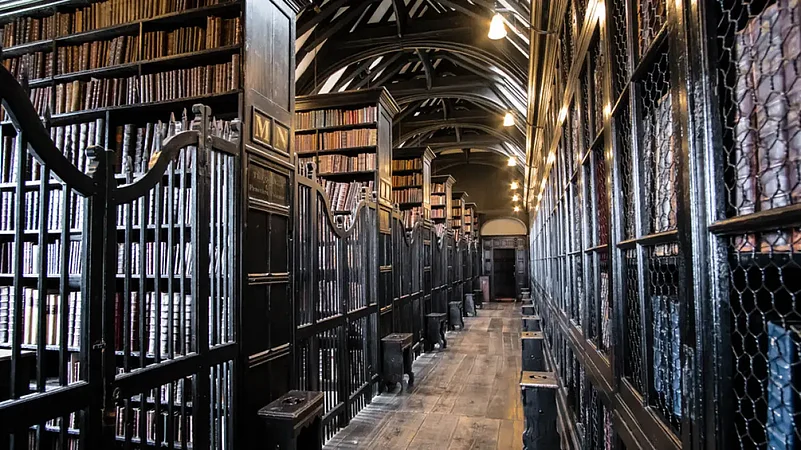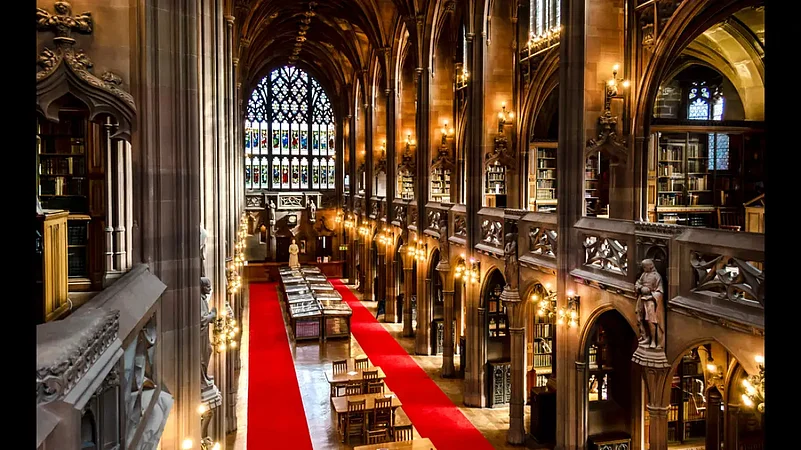I am walking back to my hotel after watching a late-night play at Home, an art-house theatre, cinema and exhibition space with a great café bar and bookshop. Home is just one of the many spaces that are helping redefine and reshape this city, transforming it into a hub of contemporary art and culture, hipster cafés, and experimental food and drink joints, yet all the while remaining rooted in its egalitarian, workers’ movement-oriented, radical heritage. This past and present interweave and meet in the many textile mills that have been transformed into modern spaces. Walk through the city and you’ll see that the old buildings are everywhere, interspersed with the new glass-and-chrome structures and record-breaking skyscrapers.
The statue I encounter in front of Home exemplifies this—of the 19th-century Prussian writer, philosopher, and social scientist Friedrich Engels, brought to the city by Turner prize-nominated artist Phil Collins from Ukraine, as part of the Manchester International Festival 2017. One of the many statues rejected by Ukraine when the state did away with socialism, it was discovered by Collins in a small village.
Earlier in the day, I spent some time at one of Engels’ favourite haunts, the Chetham’s Library. I took the alcove seat where Engels and Karl Marx had studied alongside each other in 1845, resulting in their joint work, The Communist Manifesto. Built in 1421, Chetham’s is supposed to be the oldest public collection library in the UK, with over 60,000 of their titles dating back to the early 1800s.

Manchester’s history as a place of learning is reflected in its many interesting libraries and museums. Take the John Rylands Library, for example. Set up in the memory of a textile entrepreneur and philanthropist of the same name, the jaw-dropping neo-Gothic building houses about 1.4 million items. This includes books, manuscripts, maps, photographs and visual materials spanning 5,000 years from around the world.

It has the oldest-known piece of the New Testament: the Fragment of the Gospel of John; the Epic of Gilgamesh written in cuneiform script on a clay tablet; first editions of Shakespeare’s sonnets; a Gutenberg Bible; and personal notes as well as correspondence between famed literary figures, among others. With its vaulted ceilings, Cumbrian sandstone walls, Polish oak, carvings of all kinds of creatures, and gorgeous stained-glass windows, the place looks more like a cathedral, and bears a similarity to Hogwarts. I sat on one of the many comfortable wooden seats poring through John Audubon’s spectacular Birds of America with a tall bowler hat on my head (you can borrow something from a basketful of head gear in one of the sections). I am in bibliophile heaven here—pottering around in ancient libraries, and stumbling upon amazing finds in second-hand bookstores.
Manchester and football go hand-in-hand. My two fellow travellers—like predictable men—were traipsing around the hallowed turfs of Old Trafford. They return triumphantly with more than a £100 worth (each) of Manchester United gear. The reference of Joey’s character decked in Porsche gear, with an exasperated Ross asking ‘Did a Porsche throw up on you?’ from a Friends episode is lost on them.
Football may be one of the main things, but I am here for Manchester’s street art, its legendary music scene, and its ties to the workers’ rights movement. This place has seen so much—it is the birthplace of modern industry, of Emmeline Pankhurst and Alan Turing, of Coronation Street, and ‘Baby’, the world’s first stored-memory computer. It has spawned legendary bands like Oasis, The Smiths, and Simply Red. And it is interesting to see how this city has re-invented itself as an eclectic mix of urban art, tech start-ups, vintage markets, eco-friendly co-ops, indie music and world-class eateries.
I set out to explore new-page Manchester after a day among books. I spend half a day walking around the hipster mecca of Northern Quarter and Ancoats—once a mass of derelict buildings after the decline of the textile industry, today it is famed for street art. Some of the most striking murals here were made under the Cities of Hope umbrella, which invited artists to paint pieces that focused on social issues. A stop-in-your-tracks work is a large mural on a wall featuring a honey heart with 22 worker bees (the Manchester symbol depicting the city’s work ethic). Each bee represents victims of the 2017 Manchester Arena bombing. Walk for about ten minutes and you will arrive at Affleck’s, where you can spot a wall full of mosaic artworks created by local artist Mark Kennedy. The murals feature iconic Manchester symbols like the distinctly-British drink Vimto, iconic animated character Danger Mouse, Pankhurst and the Suffragettes, and the cast of the iconic TV show, Coronation Street. Affleck’s is a legend—a tall building full of eclectic indie, records, and retro game shops, where on

The more one walks around the city, the more one realises how well old spaces can be revived to bring into the 21st century. The Museum of Science and Industry is housed in the enormous grounds of the old Liverpool Road Station, the oldest rail terminus in the world. The section on locomotives and trains is a steampunk heaven as they house one of the largest collections of working steam engines. Manchester’s links to science and tech are on show here—I had no idea that the electron, proton and neutron were all discovered by scientists educated or born in Manchester. More recently, two Russian-born physicists at the University of Manchester were awarded the 2010 Nobel Prize for physics for their work on the isolation of graphene.
The old-becoming-new motif is carried through to our dinner venue, The Refuge By Volga—the hottest table in Manchester, housed in the Gothic-style 1890s Palace Hotel building with high ceilings, decorative tiling and gilt-edged trappings. The mostly young staff come from different cultures. The late Victorian building, which once housed the Refuge Assurance Company, today showcases ‘The Glamour of Manchester’, a hand-painted mural over a glaze-tile wall. This is only one example but it’s clear that this booming post-industrial metropolis will give London a run for its money.
THE INFORMATION
GETTING THERE
Air India, British Airways, and KLM are some airlines that offer one-stop flights from various Indian cities to Manchester. One needs to apply for a UK visa to enter the country.
WHERE TO STAY
The Lowry (doubles from £110; thelowryhotel.com) is an award-winning five-star hotel in Salford. With a curved glass façade, it has stunning views, a riverside restaurant and a spa. Crowne Plaza Manchester City Centre (doubles from £72; crowneplaza.com) is another option in a great, accessible location.
WHERE TO EAT
Albert’s Schloss, for over 10 heritage brews on tap and a Bavarian Cook Haus-style menu.
Mackie Mayor, for local food with a twist. It’s an erstwhile early- Victorian meat market refurbished into a community food hall.
Bundobust, for vegetarian Indian fare, or The Curry Mile in Rusholme for its legendary lineup of more than 60 Asian restaurants that includes Indian, Pakistani, Bangladeshi and Sri Lankan joints.
WHAT TO SEE & DO
Manchester’s many theatres host contemporary plays, musicals, and concerts. Try the Manchester Opera House, The Palace Theatre, the Royal Exchange Theatre, or Home.
Take a taxi tour with John Consterdine, the city’s only Green Badge Tour Guide and Taxi Driver. Book in advance at manchestertaxitours.co.uk.
Visit the People’s History Museum to trace 200 years of British revolutions and reforms.
See Manchester United or Manchester City play. Take a selfie at their home stadiums and sample authentic merchandise.
Take a day trip to York. It has Roman roots, a Viking past, and is a short train ride away. Take a Harry Potter themed walk around the city.
Go on a guided city walk with Hayley Finn. It’s a city street art tour that also explores housing and social issues. Check out the tours at theskyliner.org.
Buy old books and comics from stores around Shudehill, Arndale Centre and Northern Quarter. They shelf everything from 60s crime to boxing memorabilia, annuals, and war weaponry tomes. Bargain prices can be as low as 50p.
Just 15 minutes from Manchester's city centre is The Quays, Greater Manchester's unique waterfront destination. Here you'll find world-class entertainment, leisure and cultural facilities, including the Imperial War Museum North, Emirates Old Trafford, The Lowry, Ordsall Hall and a host of water-based and sporting activities.


























